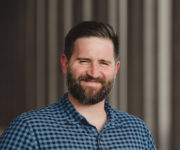Meet the Match
A Special Olympics Leader Dreams of Unified Sports Future
Daniyal Alvi always held out hope he might represent Pakistan one day.
Born in the Gulistan-e-Jauhar neighborhood of Karachi, Daniyal spent hours playing outside of his apartment block with his friends. His father, who worked as a cricket journalist for national and international magazines, would get home from work and bowl to Daniyal in the alleys. By the age of 12, he had made his cricket academy’s under-15 team. A few years later, he was competing nationally in soccer and tennis.
When he was 16 years old, Daniyal decided to volunteer with Special Olympics Pakistan. Volunteering gave him a chance to stay active on the coaching side of sports, and exposed him to new ideas about the role sport can play in people’s lives.
“Honestly, I was just looking to do something with my summer vacation,” Daniyal laughs. “Special Olympics gave me the opportunity to train athletes for a few months. Then when unified sports came into the picture, I started thinking that sports could be a career avenue for me.”
Through secondary school and university, Daniyal continued developing this interest, serving in sports administration roles. During university at the Institute of Business Administration, he ran and was elected as a manager for the sports society, a one-year term that required him to manage sports activities for the student body. It was around this time he became more involved with Special Olympics, traveling to the World Games as the cricket coach (2006), tennis coach (2007) and football coach (2011).
In 2012, Daniyal received his bachelor of business administration with a concentration in management and marketing. As he sought out work in the corporate sector, he felt like something was “biting” in the back of his mind. He felt a pull toward Special Olympics.
“I thought I could take a part-time position for three or four months until I could begin a master’s degree program,” Daniyal says. “But I couldn’t achieve any of my objectives at that time. I realized I would need a lot more time if I was going to make a difference. I decided to give it another year—that was almost three years ago.”
In 2015, Daniyal joined Special Olympics Pakistan officially as the manager, operations and organizational development and now serves as the organization’s national director.
Daniyal believes that while most people understand the essential benefits of sports, there are important added benefits to people with intellectual disabilities.
“Sport is an avenue for them to come out and experience a different environment; an environment where they’re not judged by what they do or say, but where they get to express themselves,” Daniyal says. “For many special athletes, they may not be able to look you in the eyes their first day. That same child, after going through training and then getting a chance to attend the national and world games, they’re completely transformed.”
The other benefits learned through sports—confidence, leadership, teamwork—also have valuable application to their day-to-day lives. Through sports, Daniyal’s organization tries to bridge this gap. Since its founding in 1989, and first National Games in 1991 with only 71 athletes, Special Olympics Pakistan has grown to include 24,914 registered athletes, with offices in all four of the country’s provinces.
According to statistics from Pakistan’s last census in 1998, there are approximately 3.3 million people with disabilities in the country and 531 special schools catering to the needs of children with disabilities. Many of these children from lower-income backgrounds, and their families struggle to provide good education, healthcare, and community exposure to their children (Special Olympics hosts a program, Healthy Athletes, that supports these families by providing nutrition needs).
Daniyal saw his participation in the U.S. Department of State Global Sports Mentoring Program as an opportunity to be exposed to and learn ideas and practices in the United States that can be directly applied to promoting inclusion and creating a wider impact in Pakistan. He is especially focused on programs, such as the Unified Champion Schools and Unified Sports programs that have gained prominence in the U.S.
“We have always done recreational unified sports,” Daniyal says. “But that’s it—there wouldn’t be a lasting connection with the school. For me, it’s as simple as connecting a special school with a mainstream school and having them work together, organizing inter-school tournaments. This is a first step in creating a bridge of inclusion from sports to education to society.”
On the GSMP, Daniyal worked with mentor Riley Bowlin, Special Olympics program and event facilitator for Chicago Park District, home to the largest running Special Olympics program implemented by any public park district in the United States and the birthplace of the movement in 1968. With a strong reputation and history of promoting inclusion through unified sports programs, this mentorship site was ideal for Daniyal as he learned more about building inclusive environments and developing sustainable programs back home. Together, Daniyal and Riley are exchanging important knowledge and creating a plan that continues pushing toward worldwide inclusion of people of different ability levels.

